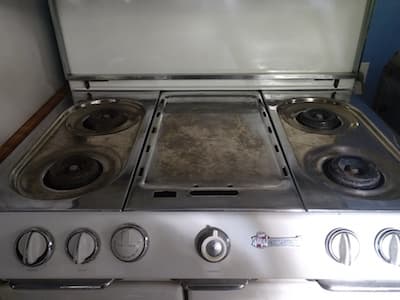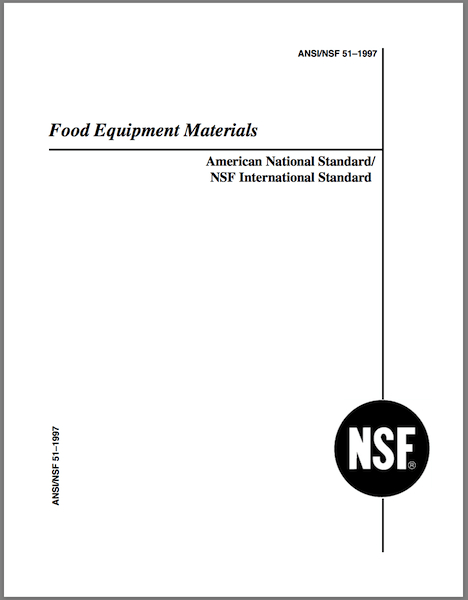
Curated with aloha by
Ted Mooney, P.E. RET

The authoritative public forum
for Metal Finishing 1989-2025

-----
Is chrome plating safe for food processing tools or machines?
Q. We are a pharmacy company and want to do chrome plating for our machines. Some of the parts are made contact with the product. so we want to know if this process is safe and food grade.
Voppy Anggraitopharmacy - Jakarta, Indonesia
2006
A. Yes, hard chrome plating is used on machinery for food processing on such components as doctor blades and the surfaces they doctor. In addition, some food service items like spatulas, serving spoons, etc. are chrome plated. I have a table fork I keep as a souvenir that was part of a copper nickel chrome plated steel flatware set. It is terribly rusty, so it's probably not the best finish for flatware, but for durability reasons rather than safety.

Ted Mooney, P.E.
Striving to live Aloha
finishing.com - Pine Beach, New Jersey
Q. This is question for a related subject.
I have a 5-piece set of "Ekko Chromium Plated" serving spoons and spatulas from the 1970's. They have never been used and are in brand-new condition except for a few scratches.
Regulations may have changed since they were manufactured, so I would like to know if they are safe to use for cooking according to today's standards. And if so, what changes in their appearance should I be aware of that would indicate they are no longer safe.
Thank you for your comments.
- Paragould, Arkansas, USA
April 4, 2013
A. Hi Donna. I don't think any regulations have changed, and don't see a problem with chrome plated serving materials, although there is nickel plating under the chrome and some people may have acquired a skin allergy to nickel since piercings are so much more common now than in the 1970s.
Chrome looks like chrome. When it no longer looks like chrome, it no longer is chrome, although that doesn't make it toxic. Enjoy your serving ware.
Regards,

Ted Mooney, P.E.
Striving to live Aloha
finishing.com - Pine Beach, New Jersey
Q. I am refurbishing an old O'Keefe and Merritt Stove and need to have the griddle re-chromed. What type of chrome is safe to cook on?
Bill Applegate- Ennis, Montana, USA
May 8, 2013
A. Hi Bill. I don't think chrome plating was used on griddles. I believe they were probably nickel plated, although that's before my time. Although I doubt that either is a hazard I'd probably go with nickel plated.
Regards,

Ted Mooney, P.E.
Striving to live Aloha
finishing.com - Pine Beach, New Jersey
|
|
? Did you get your O'Keefe and Merritt re-chromed? If so, please direct me to who you used or recommendations.
I'm having a hard time finding someone. Cherry Harrison- Dallas, Texas August 7, 2021
Luck & Regards,  Ted Mooney, P.E. RET Striving to live Aloha finishing.com - Pine Beach, New Jersey |
Q. Hi Sir,
May I inquire if hard chrome plating is safe for a braising pan?
Thank you.
stainless steel mfgr. - Pasig City, Phils.
August 27, 2013
A. Hi Edralin. Nothing is perfectly safe; it's all relative. So, while it may be reasonable for a consumer to continue to use a chrome plated something or other, it may not be reasonable for a manufacturer to introduce a given product line ...
Chrome can dissolve in acids, and I can picture some consumer somewhere pouring undiluted vinegar ⇦in bulk on eBay or Amazon [affil links] into a braising pan, and possibly dissolving some chrome into the liquid. I would suggest that you try boiling vinegar in a hard chrome plated braising pan and do a chemical analysis to see whether it dissolves any of the chrome. If that works okay, you might "accidentally" burn a pan, and come up with a couple of other tests based on plausible scenarios before feeling confident. The question probably shouldn't be how will things turn out if all goes according to plan, but how they will be if all turns to s**t. Good luck.
Regards,

Ted Mooney, P.E.
Striving to live Aloha
finishing.com - Pine Beach, New Jersey
Q. As a pharmaceuticals company, I need help in finding proper coating material for a roll I'm planning to add to one of my machines. In regards to chrome plating as a construction material for food/pharma production machinery, can you point a specific standard or reference to "safe construction materials" list or specific regulation (CFR code)?
roey albanay- jerusalem, israel
December 17, 2014
Is dough sheeter with chrome plated roller safe
Q. Hello
I bought a dough sheeter roller that the rollers are made of chrome plated steel.
And I was wondering if safe for kitchen uses?
Thank you,
- Jone, Michigan USA
March 21, 2016
A. Hi Eos. Nothing is 100% safe, but I can't see the chrome plating being the first issue of concern. I'd be more worried about electrocution hazard, burning, crushing a finger, etc. How do you even know for sure that it is chrome plated? Good luck.
Regards,

Ted Mooney, P.E. RET
Striving to live Aloha
finishing.com - Pine Beach, New Jersey
Q. My church has an industrial size mixer and our Pastor wants us to have the mixing bowl chrome plated. Would that be safe?
Karen MacDonald- Akron, Ohio USA
July 25, 2016
A. Hi Karen. I don't have any reason to think it's unsafe, but a stainless steel bowl would probably be better if that is a realistic option for you.
Regards,

Ted Mooney, P.E. RET
Striving to live Aloha
finishing.com - Pine Beach, New Jersey
Q. Is there a FDA regulation or statement that states that chrome plating is acceptable for product contact?
Tim Bash- Philadelphia, Pennsylvania USA
May 2, 2018
A. Hi Tim. There is no such regulation or statement to my knowledge. I think it's rather the reverse: there is no FDA regulation or statement prohibiting it :-)
An interesting page at http://www.productknowledge.com/north-american-food-contact-regulations.html says:
- The coating manufacturer can confirm in writing that it uses materials that conform to the FDA regulations (such as §175.300) and follow good manufacturing practice in the formulation and manufacture of the coatings, AND
- The coating is applied in a continuous film over the substrate, AND
- The finished product, e.g. cookware, etc., passes the extraction tests covered in §175.300 Tables 1 and 2 to prove conformance to the FDA Regulations, AND
- The finished product is thoroughly cleaned prior to use.
I think you will find this NSF document interesting though ⇨
https://standards.nsf.org/apps/group_public/download.php/3941/nsf51-97.pdf ⇩
Good luck.
Regards,

Ted Mooney, P.E. RET
Striving to live Aloha
finishing.com - Pine Beach, New Jersey
Ed. update Dec. 2024: Sorry, you're too late. That is no longer a free download, but a $215 one from ANSI: NSF/ANSI 51-2023.
! I became systemic allergic to chromium at my job inspecting, handling, repairing hot dip galvanized material.
The galvanized material was rinsed with hexavalent chromic acid rinse. I believe galvanizers should warn of this hazard. I am now allergic to all chromium including minute amounts in food and water. I don't think chromium should be allowed for food.
galvanizing - Waterville New York USA
August 5, 2019
A. Hi John. Sorry for your troubles.
Chromium can take three forms, as a metal (valence 0, as on an automobile grill), as a trivalent ion (valence +3, in supplements like chromium picolinate), and as hexavalent chromium (valence +6, which is indeed a toxic chemical).
All employees should be warned of all dangers in things they work with, of course. Chromium is an essential micronutrient, and some people even take chromium supplements. Whether chromium can switch oxidation/valence states is a quite involved question. Most people think there is no danger in chromium metal or trivalent chromium ... but people have been wrong before, and you're clearly welcome to your beliefs.
Luck & Regards,

Ted Mooney, P.E. RET
Striving to live Aloha
finishing.com - Pine Beach, New Jersey
Q. I have a tea service that is stamped "CHROMIUM" on the bottom of each piece. They are all in excellent condition, except for the insides which are, in spite of some scrubbing with standard dish liquid, dull grey and slightly stained (the pot more so than the other pieces). I don't know how old the set is, but I am wondering if it is safe for daily use.
Thanks.
- Wauwatosa, Wisconsin
August 23, 2020
A. Hi Paul. I would doubt that any tea serviceware was branded or trademarked "Chromium", so it's hard for anyone to even guess what you have. Still I see no reason to think that it's unsafe.
Luck & Regards,

Ted Mooney, P.E. RET
Striving to live Aloha
finishing.com - Pine Beach, New Jersey
A. Hi Paul!
Your question gave me a bit of a chuckle. Not at your expense, of course , but because of the overall prevalence of chromium as an integral part of so many alloys that have found their way into food-contact surfaces over the ages. Restaurant-grade stainless steels, once given their final passivated finish, depend upon chromium oxides to protect the substrate from further oxidative attack. Those beautiful depression-era wrought aluminum serving dishes also have some Cr in them, and it is part of what allows the metal to stay relatively unaffected by normal use.
Think about it this way... normal use isn't nearly as chemically aggressive as the conditions that would free the chromium into the food. I mean, please don't use 5% or greater nitric acid to make a batch of pickles in your teapot, and you should be all set.
In all seriousness, though:
One of the things I've done to try to save my shop some money in waste hauling fees is to have lab analyses done on our spent baths to determine what can legally just be yeeted down the drain. We passivate high chromium stainless steels in many different solutions, and as it turns out, the citric acid baths do not actually leach chromium off parts. In foods, you're encountering similar mild organic acids. Our nitric baths pick up chromium, but I dearly hope your family recipe for bread n butter cukes does not include a splash of 42-baumé nitric! Yow!
To put your mind at ease, simply avoid extremes of pH, as you would do with any metallic dish. Don't use bleach on the stainless fridge, don't scramble eggs on an uncoated aluminum skillet, and yeah no extra sour, gut-corroding, nitric tea in your teapot.
Cheers!

Rachel Mackintosh
lab rat - Greenfield, Vermont
Q, A, or Comment on THIS thread -or- Start a NEW Thread

